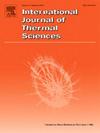调查有风和无风条件下大型石油衍生物储罐的辐射、有毒和高温气体火灾危险性
IF 4.9
2区 工程技术
Q1 ENGINEERING, MECHANICAL
International Journal of Thermal Sciences
Pub Date : 2024-10-30
DOI:10.1016/j.ijthermalsci.2024.109504
引用次数: 0
摘要
本研究的主要目的是检查在装有汽油、煤油和原油这三种标准炼油厂生产燃料的储油罐内发生的各种火灾情况。此外,本研究还旨在分析一氧化碳和一氧化碳污染物的排放、高温气体的温度以及燃料储罐燃烧产生的辐射排放,并考虑了直径分别为 25 米、50 米和 75 米的实际规模储罐。本研究通过同时比较不同环境条件下的上述危害,并将风的存在与否作为影响危害传播的关键因素进行了创新。此外,辐射效应被认为是储油罐附近最主要的危害。此外,风会增强其移动方向的辐射水平,并产生明显影响。风速从 0 米/秒增加到 15 米/秒,会导致安全距离增加 1.5 倍。在没有风的情况下,一氧化碳和二氧化碳以及气体高温不会造成破坏性威胁。然而,风会使这些危害更接近地球表面。在风速为 15 米/秒的情况下,这些危害会达到距地面约 5 米的高度。值得注意的是,汽油燃料被认为更具危险性。本文章由计算机程序翻译,如有差异,请以英文原文为准。
Investigating radiation, toxic and hot gases fire hazards in large-scale storage tanks for oil derivatives with and without wind conditions
The primary objective of this study is to examine various fire scenarios occurring within storage tanks containing three standard refinery-produced fuels: gasoline, kerosene, and crude oil. Additionally, the aim is to analyze the emissions of CO and CO₂ pollutants, the temperature of hot gases, and the radiation emissions resulting from the combustion of fuel tanks, considering real-scale tanks with diameters of 25, 50, and 75 m. This research introduces innovation by concurrently comparing the abovementioned hazards under varying environmental conditions, considering the presence or absence of wind as a critical factor influencing hazard propagation. In addition, the radiation effect is identified as the most significant hazard near the storage tanks. Furthermore, wind can intensify radiation levels in the direction of its movement, with a noticeable impact. Increasing wind speed from zero to 15 m/s results in a 1.5-fold increase in the safety distance. Without wind, CO and CO2, along with high gas temperatures, do not pose destructive threats. However, wind causes these hazards to extend closer to the Earth's surface. Under wind speeds of 15 m/s, these hazards reach a height of approximately 5 m above the ground. Notably, gasoline fuel is recognized as more perilous.
求助全文
通过发布文献求助,成功后即可免费获取论文全文。
去求助
来源期刊

International Journal of Thermal Sciences
工程技术-工程:机械
CiteScore
8.10
自引率
11.10%
发文量
531
审稿时长
55 days
期刊介绍:
The International Journal of Thermal Sciences is a journal devoted to the publication of fundamental studies on the physics of transfer processes in general, with an emphasis on thermal aspects and also applied research on various processes, energy systems and the environment. Articles are published in English and French, and are subject to peer review.
The fundamental subjects considered within the scope of the journal are:
* Heat and relevant mass transfer at all scales (nano, micro and macro) and in all types of material (heterogeneous, composites, biological,...) and fluid flow
* Forced, natural or mixed convection in reactive or non-reactive media
* Single or multi–phase fluid flow with or without phase change
* Near–and far–field radiative heat transfer
* Combined modes of heat transfer in complex systems (for example, plasmas, biological, geological,...)
* Multiscale modelling
The applied research topics include:
* Heat exchangers, heat pipes, cooling processes
* Transport phenomena taking place in industrial processes (chemical, food and agricultural, metallurgical, space and aeronautical, automobile industries)
* Nano–and micro–technology for energy, space, biosystems and devices
* Heat transport analysis in advanced systems
* Impact of energy–related processes on environment, and emerging energy systems
The study of thermophysical properties of materials and fluids, thermal measurement techniques, inverse methods, and the developments of experimental methods are within the scope of the International Journal of Thermal Sciences which also covers the modelling, and numerical methods applied to thermal transfer.
 求助内容:
求助内容: 应助结果提醒方式:
应助结果提醒方式:


